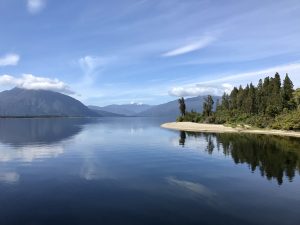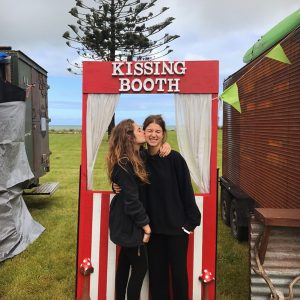December 25th 1769: Aboard ‘The Endeavour’, anchored just off Three Kings Islands.
James Cook stood to toast his crew this Christmas Day. The wooden boards of the decking groaned in protest: his foot landed in a short, sharp movement to the left, followed quickly by his right, as if his legs were attempting to perform an Irish jig without the rest of his body’s consent. A few men noticed this stumble and boomed laughs across the table: the sound was affectionate but lacked the standard of respect the captain had become accustomed to on The Endeavour; Cook took a moment to enjoy the camaraderie.
He thought back to their arrival in this land three months ago; how time plays with your mind, feeling fast and slow simultaneously. He could hear Young’s distant shouts of triumph above the noise at the table; the day a piece of earth was christened Young Nicks Head to mark the boy’s success – a promise fulfilled by the captain. The boy’s sharp eyes scanning the tapestry of sea locked on this bead of hope, like spotting the first fin in a family of cruising dolphins. Young’s excitement in his achievement was almost as gratifying as the sighting itself. But the landing brought troubles Cook had hoped to avoid, and in the last weeks, each course taken persistently reminded them they were in unchartered territories. The anchorage tonight was no different, off the northern-most tip of this distant land. Tonight, Cook hoped he and his men could find comfort in tradition and interior space.
The ship rolled in the swells of the sea, stiffly resisting the wind, unable to bend to absorb the shock. The storm (and the few drinks the captain had consumed with his men on this celebratory occasion) made standing feel as tough as sailing on these seas. Cook imagined the small pieces of land on their port side as anchored masses, plunging into dark waters to emerge again for the next wave; in his mind’s eye they mirrored the movement of his ship, and this perception, although fantastical, was a comfort to him. The lands permanency gave solidity to their own island of wood and sails.
The captain was brought back to the table by the clatter of a cup hitting the deck. It was not until it made contact with the floor that he realised he had watched its whole journey, rolling in a curve towards him, to spill flecks of red wine on his off-white trousers. The crew, unaware that Cook’s mind had temporarily wandered to the hazardous upper-deck, looked disappointed by his slowed reactions. Their expressions seemed apologetic more than conciliatory, as if they had failed to uphold their end of a mutual protective relationship.
Knowing the ease with which a joyous drink could turn sombre (or in fact clamorous), Cook enthusiastically seized the empty cup and held it aloft, offering a theatrical flailing of arms alongside a wide and rare grin:
“A toast!”
The crew cheered their festive support. Cook knew that his men respected him, even liked him, but he didn’t often feel included in the joke; a human compass. He thought that humour and affection must find balance by holding hands. Steadying himself and licking his reddened lips, he spoke:
“Firstly, thanks to Joseph, for providing our bird for this evening’s feast. Tonight, we will be dining on gannet pie!”
In their drunken state, this revelation became unbearably funny: uproar – of both the feigned-angry kind and belly-laughing kind – ensued, with some crew faking belches and others rubbing their stomachs enthusiastically. Joseph Banks contrived an expression of deep insult, digging his eyebrows into his tired sockets. About to stand to defend his invention, Cook stepped in: he recognised the need to move the toast along – a level of perception and intuition learned by a captain:
“No, it is not our traditional goose pie, but this is not a traditional Christmas”, he continued.
“You can say that again. The first bloody Christmas this place has seen”, one of the crew mates chimed in.
“Don’t forget the Dutch fella”, another responded. “Abel Tasman. He was here around this time too. Wonder if they found a goose…” (a chorus of appreciative chuckles and murmurs).
Cook knew Abel Tasman’s story well, the first man to find and name this spot on the edge of the world. He was about to reply that in fact they ate pork on New Zealand’s first Christmas Day… The captain had studied Tasman’s diaries, memorising descriptions of land; coordinates and sentiments. The words could only teach him so much, but he had hoped to avoid Tasman’s mistakes; to learn from history. He knew too well that unknown lands come with unknown peoples: Cook had become sufficient in pushing fears of the unfamiliar to the back part of his mind, but it goes against instinct; for those men who depend on predisposition, strangeness is pure threat; an unfamiliar fruit is always poison before it can become medicine.
Tasman anchored in a bay of golden sands, and minutes later departed from Murderer’s Bay. The beauty of the place had not changed, for the eyes cannot remember. But the mind cannot completely forget: for those who’ve heard about Tasman’s landing, this bay will always show red sands, even when they’re no longer conscious of why – feelings outliving memories. The explorer himself printed this name in these shallow waters, but Cook considered that the Maoris may well have inscribed the same in their own tongue to describe their first encounter with Europeans; there was death on both sides, without a universal language to speak of peace. He wondered how these syllables might sound to his ears.
Now the captain felt Tasman’s journey had become part of his own, imagining an affinity with this man as strong as blood. The same blood, shed and lost. Sometimes at night he heard the Dutch explorer perform a reading of his own encounter with the Maori people. And it was always that first, even though he’d had many since, and of the better kind. At the end Tasman would turn to Cook and simply shake his head, and Cook would slip away, calling that he came in peace. He woke feeling angry at himself and disappointed in mankind.
It was the quiet that shocked Cook back into the present, every face now turned on his, in expectation of direction. He imagined it was the sea that had made his mind so vulnerable to wandering; thoughts meandering like waves with no end, stopped only by some form of obstruction. Who would have thought quiet could become an obstruction? Thinking about his own thoughts… He rebuked his own inner melancholy.
He returned to the surface of his mind – that part which feels like it’s doing no thinking at all – and, as if in response to a request, he shouted: “Alright, alright. Let us remember this country’s first Christmas, before we eat and fall asleep in our chairs. A toast to those who came before us!” And he began to tell a story.

